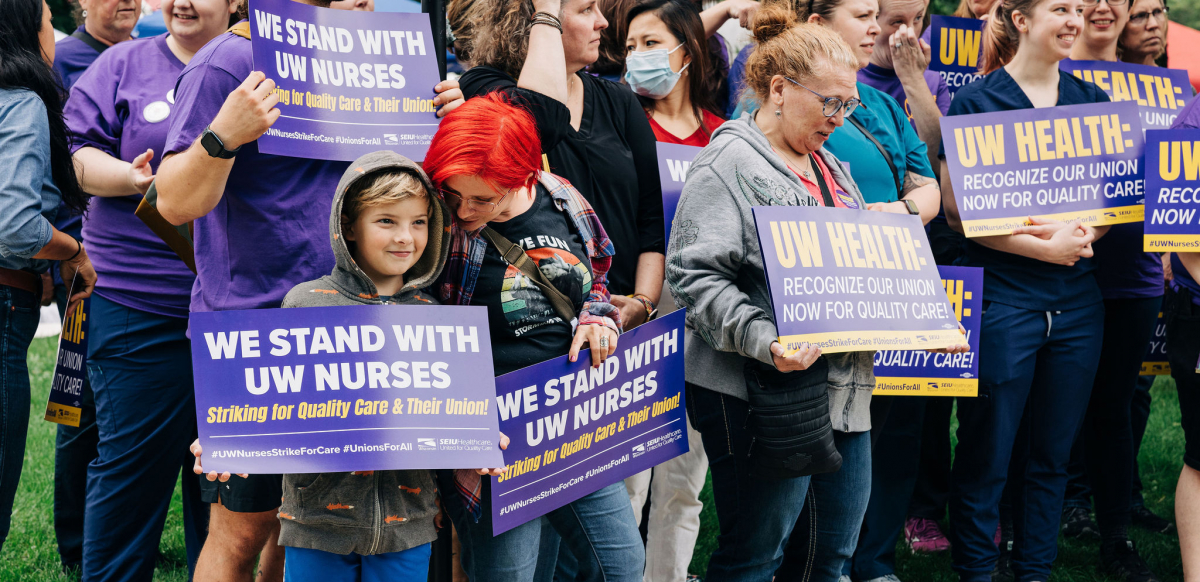After Strike Threat, Wisconsin Nurses Get a Possible Path to Union Recognition

UW Health nurses and supporters rallied on Labor Day in Madison, Wisconsin. Photo: SEIU Healthcare Wisconsin
A three-day strike by Wisconsin nurses is off this week, after SEIU Healthcare Wisconsin (part of the Service Employees union) and UW Health (the University of Wisconsin's medical system) reached an agreement on a path toward the potential recognition of the union. The deal came after five days of mediation conducted by the Wisconsin Employment Relations Commission (WERC), a state agency regulating labor relations in the public sector, and under the auspices of Wisconsin Governor Tony Evers.
Nurses had announced a three-day strike beginning on September 13 to force the employer to address their concerns on issues including staffing and compensation, as well as the continuing refusal to recognize the union.
Under the terms of the agreement, WERC will now rule on whether UW Health can voluntarily recognize and bargain with SEIU Healthcare Wisconsin. In addition, UW Health, which previously refused to have anything to do with the union, agreed to recognize nurses’ right to participate in union activity and to “go to the table immediately to meet and discuss critical nursing issues through a union-management process.”
In a joint televised release lasting more than 19 minutes, nurses appeared ecstatic at this sudden turn of events. “UW Health nurses are part of a resurgent movement of working people throughout the country who are rising up to demand respect, protections and unions for all,” nurse union leaders said in an email statement thanking supporters. The nurses and their many well-wishers celebrated their victory at Madison’s Labor Temple.
WHY DID THEY DO IT?
For years, since the passage of Wisconsin’s Act 10 in 2011, UW Health maintained that it was not legal for it to recognize and bargain with a union, even though it had been doing exactly that with nurses represented by SEIU for a very long time before the passage of Act 10. (For more details, see our previous story.)
Now it appears willing to agree to abide by a decision by WERC as to whether it can legally bargain. Why the sudden reversal? Certainly, the determination of the nurses and the severe disruption their strike would cause to UW Health’s operations had a lot to do with it. Support from the community and organized labor showed that the nurses were not alone and had many allies. Interventions by Governor Evers and Wisconsin Attorney General Joshua Kaul helped too.
The start of a massive three-day strike by 15,000 private-sector nurses at 15 hospitals in neighboring Minnesota on September 12 and the difficulty in hiring traveling nurses no doubt also were important factors. Nurses everywhere, having been on the frontlines during a stressful and dangerous pandemic (which continues to claim over 300 lives per day in the U.S. alone) are clearly motivated to have their voices heard and listened to.
WHAT HAPPENS NEXT?
WERC is anticipated to issue a ruling soon as to whether UW Health can voluntarily recognize SEIU as the nurses’ collective bargaining representative, and in what manner this can be done (i.e. whether through an election or a card check process). SEIU previously claimed to have union authorization cards from 1,500 of the 2,600 UW Health nurses.
The union has agreed not to strike pending WERC’s decision. Both sides agreed that either party can appeal WERC’s decision in the courts or directly at Wisconsin’s Supreme Court; in that event, a final decision might be delayed. The majority on the state Supreme Court are conservative Republicans, so it is not clear what a final legal decision there would look like.

SUPPORT LABOR NOTES
BECOME A MONTHLY DONOR
Give $10 a month or more and get our "Fight the Boss, Build the Union" T-shirt.
Both SEIU and UW Health have also agreed to non-binding discussions over issues facing nurses while awaiting a final legal resolution.
Probably the single greatest issue motivating UW nurses is the lack of proper staffing, which greatly impacts the quality of patient care and the working conditions of the nurses. Compensation issues are also prominent, including (ironically) the cost of health insurance, along with salaries and retention incentives. Training and continuing education opportunities for the nurses have been eroded and are also great concerns. Most importantly, the nurses are determined to have their voices listened to and respected on the job.
WHAT'S IN THE DEAL
According to a press release from SEIU Healthcare Wisconsin, the agreement’s key provisions are:
- Nurses have the right to join SEIU Healthcare Wisconsin and become members immediately.
- Nurses and UWHCA will go to the table immediately to meet and discuss critical nursing issues through a union-management process. Nurses can raise the full range of issues and solutions they want.
- Management recognizes nurses’ right to self-organization, participation in their union and other concerted activity.
- Management and nurses commit to working together to build a productive, collaborative relationship rooted in mutual respect and civility.
- Management has agreed to prioritize working with nurses toward a renewed "peer support" process for disciplinary actions.
- Establishment of a process for nurses to potentially achieve formal collective bargaining rights through the Wisconsin Employment Relations Commission (WERC).
David Nack is an emeritus professor and Michael Childers is a professor at the University of Wisconsin School for Workers.





